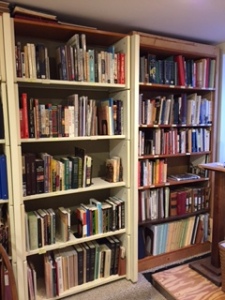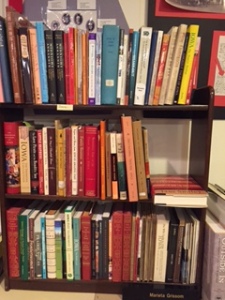If planning a trip to a research library other than in Des Moines, we tend to think we need to go to Salt Lake City, Fort Wayne, Indiana, or Independence, Missouri. Those are the “big” libraries that everyone talks about.
Recently Dave and I spent 2½ days researching at the Wisconsin Historical Society in Madison, Wisconsin. This was our third visit and definitely most intense. It was on our first visit here that Dave discovered resources for Grisham/Grissom in Shelby County, Indiana. You may ask, Indiana resources in Wisconsin? Well, it gets even better… Louisa County, Virginia, resources in Wisconsin!
The Wisconsin Historical Society (WHS) has amazing resources. Have you heard of the Draper papers? Lyman Draper worked for WHS in the 1800s, but travelled extensively throughout the Daniel Boone territory of Virginia, North Carolina, Kentucky, Tennessee, and Missouri, and neighboring areas… essentially, throughout Appalachia (others refer to it as the Trans-Allegheny West). He was gathering information about anyone and everyone for books he planned to write. He never got around to writing the books, but his notes, mountains of them, are held at the WHS.
Dave and I were not researching in the Draper papers, so why were we so enthralled? Well, WHS became a repository for other resources from the Appalachian region, then it became a repository for resources from everywhere! For example, WHS has nearly every book ever published for historians and genealogists researching Warren County, Iowa. You might say, well, Iowa is a neighboring state. That doesn’t matter. WHS collects/purchases material from all over.
On this trip, Dave and I were researching Louisa County, Virginia, and neighboring Hanover County; the holdings at WHS are extensive! Literally, we both worked as fast as possible for two days and we only worked in these two counties. Our last half day, we finally ventured into other areas.
Prior to our trip, I had thoroughly researched the WHS card catalog and I had prepared spreadsheets listing the items we needed to look at. BUT, and we already knew this, WHS shelves are OPEN. Therefore, as we looked for the books on the spreadsheets, we also looked at neighboring books on the shelves and found even more materials to look at that I had not found as I prepared for our visit.
Another awesome thing about this repository: use of the scanners is FREE. Just provide your own flash drive and you are set to scan away! If you need to use the microfilm readers, they are also state-of-the-art.
I met briefly with a genealogy friend at the library. I asked about the economic impact of the library to Madison. As far as he knows, no one has placed a dollar figure on it, but it is apparent the impact is enormous. In our case, we stayed three nights in a hotel, spent some money in two shopping areas, and ate evening meals at local restaurants. However, we brought snacks for lunch so we didn’t have to take a long lunch break. We could not eat in the library, but could eat in the hallway. Water bottles are allowed in the library.
WHS is located on the University of Wisconsin—Madison campus. We visited during a school break, so the library was not open in the evening. During the school year it is open until 9:00 p.m.
Now, we just have to process all of the information we gathered. That will take much longer than our WHS visit.
Check out the WHS website at: http://www.wisconsinhistory.org. You may be surprised with what you find; better yet, plan a visit.
[I don’t usually cross-publish, but I am also submitting this for publication in the Warren County [Iowa] Genealogical Society newsletter.)


